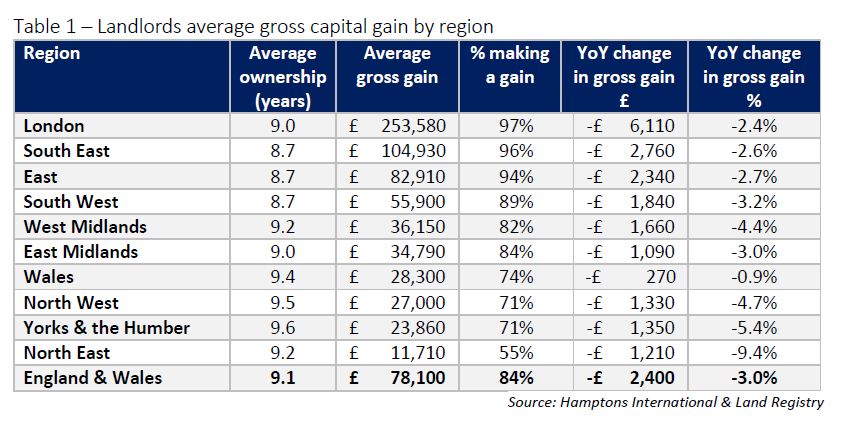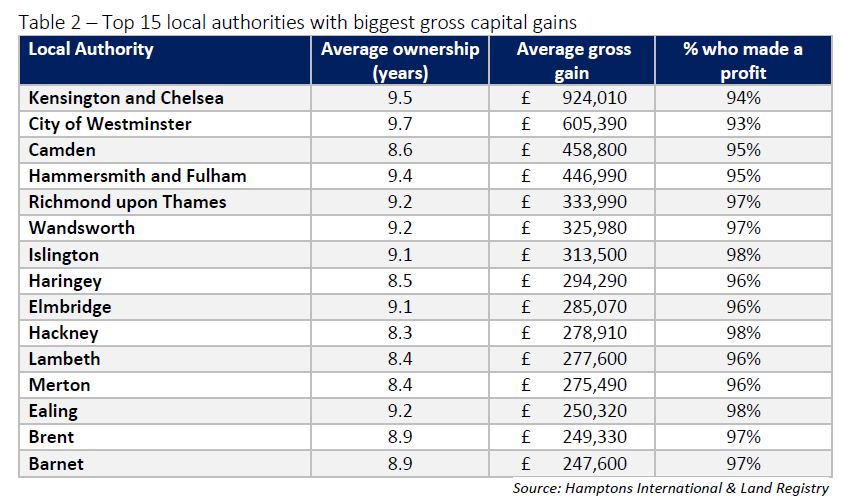While landlords derive a regular income stream from rent, a substantial proportion of an investors’ overall return comes from capital growth.
But landlords can only see these returns once they sell up or re-finance.
Hamptons International estimate that last year over 150,000 properties were sold by landlords in England and Wales.
Landlords who sold in 2019 typically owned their property for 9.1 years and on average sold it for £78,100 more than they paid for it.
This equates to a gross gain of 42% on their initial investment (chart 1, table 1).
In 2019, 84% of landlords who sold their buy-to-let property in England and Wales made a pre-tax capital gain.
With the highest house prices and strongest price growth, sellers in London and the South East made the most in absolute terms.
The average London landlord made a gross gain of £253,580, over 20 times that of a seller in the North East where the average gain was £11,710.
The South East followed, with a £104,930 average gross capital gain (table 1).
The top 15 local authorities where landlords made the biggest gains were all within the M25.
Investors selling up in Kensington and Chelsea made the biggest gross gains.
On average they sold their buy-to-lets for £924,010 more than they paid for them, having owned them for 9.5 years (table 2).
Landlords in London were also most likely to make a profit, with 97% selling their property for more than they paid for it.
Landlords selling up in the North East were most likely to make a loss – 45% of landlords who sold up last year sold their property for less than they originally paid for it (table 1).
The average gross gain made by a landlord when selling up (£78,100 in 2019) fell for the second consecutive year, reaching the lowest level since 2015.
In 2018, the average landlord sold their home for £80,500 more than they paid for it, £2,400 or 3% more than in 2019 (table 1).
This is mainly because landlords who sold up in 2018 generally bought in 2009, the bottom of the market.
House prices rose 46% between 2009 and 2018, whereas prices rose 38% between 2010 and 2019.
Rental growth on renewed tenancies
Rents on renewed tenancies in Great Britain fell 1.6% in May 2020, the third consecutive monthly fall.
London and the South East were the only regions where rents fell annually, down 4.7% and 1.2% year-on-year respectively.
Meanwhile outside of London, rents rose 0.9% year-on-year.
Scotland recorded the strongest rental growth last month (3.6%), followed by Wales (3.4%) and the North (2.3%) (table 3).
Aneisha Beveridge, Head of Research at Hamptons International, said:
“The profitability of the buy-to-let market has been questioned in recent years and is one of the main reasons why some landlords have chosen to sell up.
“But one of the biggest bonuses from cashing in comes from the capital gain on a property. Over a third of landlords’ total return comes from capital growth rather than rental income in Great Britain.
“Landlords in the South, where house prices are higher and historic price growth has been stronger, saw the greatest capital gains last year. In fact, the average London landlord gain was over 20 times that of a seller in the North East where landlords are more reliant on rental income.
“But with house price growth expected to stay lower than in the past, more landlords are having to switch their focus to maximise rental income, rather than rely on capital growth.
“Despite the rise in demand from tenants looking to move home as the housing market reopened last month, income pressures continued to weigh on rental growth.
“Rents on renewed tenancies in Great Britain fell 1.6% in May, however this figure masks regional variations.
“London and the South East, where incomes are most constrained, saw rents fall for the third consecutive month.
“However outside of the capital, rents continued to rise, which is a reversal of the trends we saw this time last year.”






Their capital gains are going to fall a lot more in 2020 and 2021 ….
You must be logged in to like or dislike this comments.
Click to login
Don't have an account? Click here to register
Conclusion if you put more in you get more out.
You must be logged in to like or dislike this comments.
Click to login
Don't have an account? Click here to register